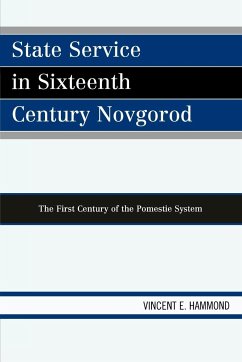State Service in Sixteenth Century Novgorod is about the first century of the legal development of the pomestie established by Ivan III after the conquest of Novgorod. The cadasters from the two provinces (Shelonskaia and Vodskaia) with the highest concentration of pomesties showed most remained in the original landlord's family. The acquisition of additional land from deceased family members and the exchanges for land near other relatives without the state's prior permission is evidence of its recognition of the family's interest in the land. Although the turnover was higher after the 1550s, most estates no longer in the original families' possession were abandoned or confiscated by Ivan IV's oprichniks. Since patrimonial votchinas were confiscated too, the higher turnover is evidence of the tsar's fear of treason rather than the pomestie's conditionality. The continuing possession of most Vodskaia tax units held in pomestie tenure in 1582 by the original landlords' families enfeoffed a century earlier supports this thesis. These findings negate the traditional distinction between the conditional pomestie and allodial votchina. The loyal pomeshchiks of sixteenth century Russia could expect to pass their lands to other family members as long as they served the state.



